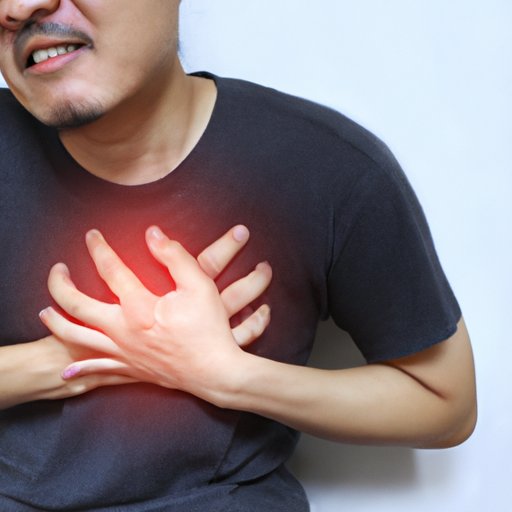
I. Introduction
Stress is a natural part of life, but it can also have a serious impact on our physical health. In fact, research has shown that stress can contribute to a variety of health problems, including high blood pressure, heart disease, and chest pain. In this article, we will explore the relationship between stress and chest pain, outline the various types of chest pain caused by stress, and discuss effective ways to reduce stress and relieve chest pain.
II. The Relationship Between Stress and Chest Pain: What You Need to Know
Chest pain is a common symptom that can be caused by a wide range of factors, including heart disease, lung problems, and gastrointestinal issues. However, stress can also be a major contributor to chest pain. Three types of chest pain that may be linked to stress include:
- Angina: Typically described as a tight or squeezing pain in the middle of the chest, angina can be triggered by physical activity or emotional stress.
- Costochondritis: This is an inflammation of the cartilage that connects the ribs to the breastbone. Stress can weaken the immune system, making people more susceptible to infections like this.
- Muscle tension: Stress can cause the muscles in the chest, neck, and shoulders to tighten, leading to pain and discomfort in the chest.
Stress can lead to chest pain in a number of ways. When people experience stress, their bodies release hormones that cause the heart to beat faster, the blood vessels to narrow, and the muscles to tense up. Over time, this can lead to an increase in blood pressure and heart rate, putting extra strain on the heart and causing chest pain.
III. The Science of Stress-Induced Chest Pain: An Overview
The body’s physical response to stress is known as the “fight or flight” response, which is controlled by the sympathetic nervous system. When people experience stress, their bodies enter a state of heightened alertness and arousal, which can trigger chest pain. In addition, stress can also cause the release of stress hormones like cortisol, which can have negative effects on the body.
IV. The Psychological and Physical Effects of Chronic Stress on the Body
Chronic stress can have a significant impact on both the mind and body. Over time, stress can lead to a weakened immune system, increased inflammation, and a greater risk of chronic diseases like heart disease and diabetes. In addition, chronic stress can also manifest itself in physical symptoms like chest pain, headaches, and fatigue. It’s important to recognize the signs of chronic stress and take steps to manage it before it leads to more serious health problems.
V. Can Stress Really Cause Chest Pain? Debunking Common Myths
There are many myths and misconceptions surrounding stress and chest pain. For example, some people believe that chest pain always indicates a heart attack, while others are skeptical that stress could really be the cause. However, the truth is that stress can indeed lead to chest pain. The key is to learn how to distinguish between stress-induced chest pain and other causes, so that appropriate treatment can be given.
VI. Reducing Stress to Relieve Chest Pain: Proven Techniques
Fortunately, there are many effective techniques for reducing stress and relieving chest pain. Some of the most proven techniques include:
- Exercise: Getting regular exercise can help reduce stress and improve overall health.
- Meditation: Practicing mindfulness meditation has been shown to reduce stress levels and alleviate chest pain.
- Yoga: Yoga is a gentle, low-impact form of exercise that can help reduce stress and tension in the body.
- Breathing exercises: Deep breathing exercises can help calm the body and reduce stress.
- Cognitive-behavioral therapy: This type of therapy can help people recognize and change negative thought patterns, reducing stress and anxiety.
By incorporating these techniques into their daily lives, people can manage stress more effectively and reduce their risk of experiencing chest pain.
VII. The Connection Between Anxiety, Panic Attacks, and Chest Pain
People who experience anxiety or panic attacks may also be more likely to experience chest pain. During a panic attack, the body’s “fight or flight” response is triggered, causing rapid heartbeat, shallow breathing, and chest pain. People with anxiety disorders may also experience chest pain as a result of chronic stress and tension in the body.
VIII. When to Seek Medical Attention for Stress-Induced Chest Pain
While stress can cause chest pain, it’s important to rule out other causes as well. If someone experiences chest pain that is severe, lasts for more than a few minutes, or is accompanied by shortness of breath, dizziness, or nausea, they should seek medical attention immediately. In some cases, chest pain may be a sign of a more serious condition like a heart attack or pulmonary embolism, so it’s always better to err on the side of caution.
IX. Conclusion
Chronic stress is a major contributor to a wide range of health problems, including chest pain. By understanding the relationship between stress and physical health, and by taking steps to reduce stress and manage symptoms, people can improve their overall health and well-being. If you experience chest pain, be sure to talk to your doctor to rule out any serious underlying conditions.




